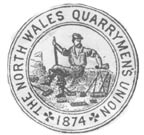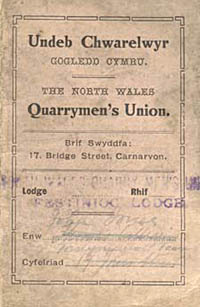|
|
Pay, Strikes and Living Conditions - Trade
Union Development
 Trade union
development in the 1870's was founded on changes that occurred in
methods of production, capital investment, business organisation,
transport and marketing, which transformed the slate
industry from 1830-1870. The quarrymen came to realise that they
were the masters of an immensely complicated and delicate craft,
and a craft that only they could exercise. Trade union
development in the 1870's was founded on changes that occurred in
methods of production, capital investment, business organisation,
transport and marketing, which transformed the slate
industry from 1830-1870. The quarrymen came to realise that they
were the masters of an immensely complicated and delicate craft,
and a craft that only they could exercise.
In a situation where the quarry owner ruled as an absolute or
a benevolent monarch, there was, to put it simply, no provision
for the workers to register their dissatisfaction over working
conditions. In the face of continued victimisation the only road
open to workers was collective action. With the events of
1865
and 1869-70 fresh in their minds, the impetus for founding a
Union came not from Penrhyn, Bethesda, but from Dinorwig, Llanberis. The work was
delegated to a group of middle class local supporters of the
Dinorwig quarrymen, and the meeting was held at Caernarfon in
March 1874. At that meeting it was decided to found not the
Dinorwig Quarrymen's Union but the North Wales Quarrymen's
Union. Its membership had reached 8,297 by 1877. Such a decision
was bound to have repercussions as far as the owners were
concerned. The owners also met at Caernarfon, three months later, to
found their own association.
Unionism at Blaenau Ffestiniog
 The quarrymen of Blaenau Ffestiniog were
not as fervent in their support of the Union as the quarrymen of Penrhyn and
Dinorwig, but the next strike to hit the industry erupted at Llechwedd in 1893 for somewhat cloudy and trifling reasons. Five weeks after the first Labour Day Rally
was held in Caernarfon in 1892, J.E. Greaves received a deputation
from Llechwedd asking for a raise of 2/- (10p) per week. In the
end, both parties agreed to a raise that was 6d (2½p) per day
short of the original request. However, one senses from the existing documents
that J.E. Greaves, as chairman, was not in
favour of granting any increase at all. At the start of 1893, the
workers were still agitating for this 6d. Their request was
turned down once and for all in April. The quarrymen of Blaenau Ffestiniog were
not as fervent in their support of the Union as the quarrymen of Penrhyn and
Dinorwig, but the next strike to hit the industry erupted at Llechwedd in 1893 for somewhat cloudy and trifling reasons. Five weeks after the first Labour Day Rally
was held in Caernarfon in 1892, J.E. Greaves received a deputation
from Llechwedd asking for a raise of 2/- (10p) per week. In the
end, both parties agreed to a raise that was 6d (2½p) per day
short of the original request. However, one senses from the existing documents
that J.E. Greaves, as chairman, was not in
favour of granting any increase at all. At the start of 1893, the
workers were still agitating for this 6d. Their request was
turned down once and for all in April.
Blaenau Ffestiniog was the
venue for the annual Labour Day Rally the following month, with
Tom Ellis, M.P. for Meirionydd, David Lloyd George, M.P. for the
Caernarfon Boroughs, and Keir Hardie then an I.L.P. M.P. as guest
speakers. The two Welsh members did not turn up, one supposes
that they did not wish to appear on the same platform as Keir Hardie in
case of offending leading Liberals. These Liberals, included J.E. Greaves, William Jones, his
influential steward, and A. Murray Dunlop, chief manager of the Oakeley Quarry, who after standing for the Conservatives in the
1880 general election had joined the Liberals by 1893. It could
be that both Ellis and Lloyd George had heard that not only was Hardie going to support the Llechwedd workers' claim for the
elusive 6d, but also that all workers should be given a say in
the running of the quarries. With Hardies's remarks ringing in their
ears, one Griffith Jones, from Pengelli, was suspended for refusing
to obey the instructions of William Jones, the steward, to return to
his work at the quarry instead of leaving early for home. The
following day, the workers were refused permission to hold a
meeting at the quarry to discuss this action and a deputation of
three was formed to discuss the affair with J.E. Greaves. His
reaction was that everybody should return to work straight away,
one by one through the office. A five month long strike resulted. The Union was not very strong at Llechwedd, for out of a
total workforce of 486, only 125 were members. Of those members,
only 75 had paid their subs up to date.
Near to us, over the road far
below us, we saw Llechwedd Quarry heavy and silent…with no sound
of machine, chisel or hammer…
Driving wheels were still with one large one slowly revolving as
if in a deep sleep. An overwhelming silence covered the place. We
wandered towards the work offices. The same oppressive silence
was to be felt there also…A short man came to answer the
door….saying that we were welcome to wander through the quarry on
our own…Passing the silent wheels and the large empty workshop,
we came to one of the open spaces where loaded wagons converge
from all directions. The water wheel revolved slowly and slowly,
but every truck was still, the chains hanging limply and useless,
whilst no rock man was expected from the black tunnels that ran
underground…Rain had started falling by now and we had to return
to the office. On our way down we saw a lonely looking young
man…he was the manager. Warren Roberts by name. He had no idea he
said when the strike would end.
Tro Trwy'r Gogledd, O.M. Edwards, page 16-19 (trans)
|
By the beginning of July some had returned to work of their
own accord. Rioting broke out at Llechwedd, and the windows of the
quarry hospital down in the town were broken on July 13. Five
days later, W.J. Parry came to try and pour oil on
the troubled waters. Within a month, a gathering of 5,000
quarrymen filled the Caernarfon Pavilion to pledge their support
for the strikers at Llechwedd and call for compulsory
arbitration. According to Tom Ellis, the only honourable way to
end the whole dispute was for every worker to be reinstated.
Robert Pugh, who had been told that there was no work for him at
Llechwedd, announced that both he and his son were emigrating to
the United States to start a new life. Subsequently, a vote was taken to
return to work, accepting the terms laid down by J.E. Greaves.
Peace returned to Llechwedd.
This peace was not broken again until small strikes occurred in 1922, 1936 and
1985-86.
|
|
| RESOURCES |
Letter: National Union of Dock, Riverside and
General Workers to W.D. Hobson, General Manager, Penrhyn
Quarries, requesting that in future the wagons bringing the
slates from the quarries be weighed and tared to give the men the
correct weight.
Letter:National Union of Dock, Riverside and
General Workers to W.D. Hobson, General Manager, Penrhyn
Quarries, complaining about R.T. Jones, of the North Wales
Quarrymen's Union, attempts to get the Union's members to join
the Quarrymen's Union |
|